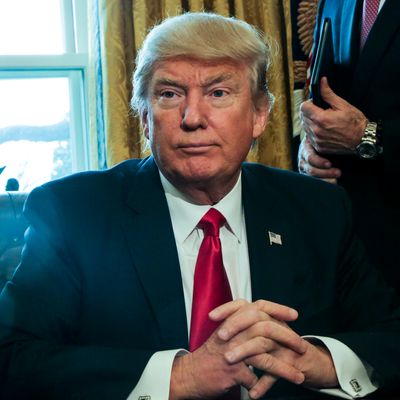
A U.S. appeals court has denied the Trump administration’s request for an emergency stay on a federal judge’s order blocking the president’s recent travel ban. Early Sunday morning, the U.S. Court of Appeals for the Ninth Circuit said it would not reinstate the ban, pending the appeal that government intends to file on Monday. Meanwhile, government agencies have suspended the ban while President Trump has appeared to question the legitimacy of the judge who issued the nationwide restraining order against the ban on Friday. Tweeting on Saturday morning in response to the block, Trump insisted that, “The opinion of this so-called judge, which essentially takes law-enforcement away from our country, is ridiculous and will be overturned!” Additional critical tweets would later follow throughout the day and night.
On Friday, Federal District Court judge James Robart temporarily blocked Trump’s week-old executive order from being enforced on a nationwide scale, leading the State Department to reinstate some 60,000 visas of previously banned travelers, the U.S. Customs and Border Protection to instruct airlines to begin allowing those passengers onto flights to the U.S., and the Department of Homeland Security to announce that it was suspending enforcement of the travel ban. The White House promised to request an emergency stay on the “outrageous” order on Friday, and did so on Saturday only to have that request rejected, pending judgment on their actual appeal. In the meantime, all travelers and refugees with valid U.S. visas are free to travel to the U.S.
The president continued to tweet about the order later Saturday, eventually firing off a series of complaints based on the false and fear-mongering notion that foreigners have some kind of unfettered access to the U.S. They don’t: The process for obtaining a visa to enter the U.S. includes a lengthy vetting, which can take up to two years and by no means guarantees entry. “What is our country coming to when a judge can halt a Homeland Security travel ban and anyone, even with bad intentions, can come into U.S.?” the president tweeted, before irresponsibly suggesting that “because the ban was lifted by a judge, many very bad and dangerous people may be pouring into our country.” Trump also said that some Middle Eastern countries agreed with the ban, but did not provide any evidence to support that claim. In the evening, he even tried to give his government lawyers some strategic advice, wondering why the administration’s lone court victory with regards to the ban wasn’t being used to counteract the block. (Judge Robart’s ruling appears to supercede the ruling Trump referenced.)
Trump’s objections notwithstanding, Robart’s order immediately suspended both the 90-day ban on citizens from Iran, Iraq, Libya, Somalia, Sudan, Syria, and Yemen, as well as the 120-day ban on refugees. Those bans will resume should the White House win an emergency stay on the order, but on Saturday morning, the Department of Homeland Security confirmed that it was complying with the ruling and had “suspended any and all actions implementing the affected sections” of Trump’s executive order. Meanwhile, airlines have been announcing that any passenger with a valid U.S. visa will be allowed to board planes to America, though it’s not clear how many people will take advantage of the opportunity to do so, particularly since the ban could be reinstated at any time.
In issuing the nationwide injunction against Trump’s order, Judge Robart — an appointee of President George W. Bush who was unanimously confirmed by the U.S. Senate in 2004 — argued that there was “no support” for the Trump administration’s argument that the government has to protect the country from citizens of the seven listed countries. In Robart’s opinion, the attorneys general of Washington and Minnesota, who had filed a lawsuit seeking to overturn the travel ban, had “met their burden of demonstrating that they face immediate and irreparable injury as a result of the signing and implementation of the Executive Order” since the order “adversely affects the states’ residents in the areas of employment, education, business, family relations and freedom to travel.”
“The States themselves are harmed by virtue of the damage that implementation of the Executive Order has inflicted on the operations and missions of their public universities and other institutions of higher learning, as well as injury to the States’ operations, tax bases and public funds,” Robart added. Politico reports that the order “appears modeled on litigation conservative states used to halt President Barack Obama’s 2014 executive actions on immigration,” in that those states argued that they have standing to challenge federal actions that affect them financially.
In another tweet sent by the president on Saturday morning, he implied that allowing “certain people” from Middle Eastern countries would lead to “death and destruction.” In addition to banning refugees, and especially Syrian refugees, Trump’s executive order had also stipulated that the U.S. give preferential treatment to persecuted religious minorities when admitting refugees in the future, which he has indicated as meaning Christians in majority-Muslim countries. That priority classification for religious minorities was also blocked by Robart’s ruling.
This post has been updated throughout to reflect newly available information and context.






























